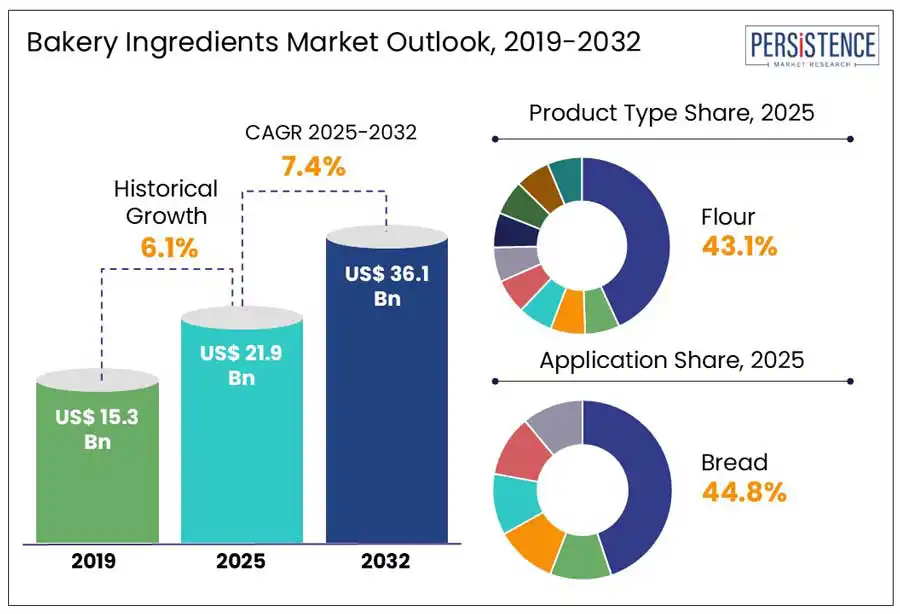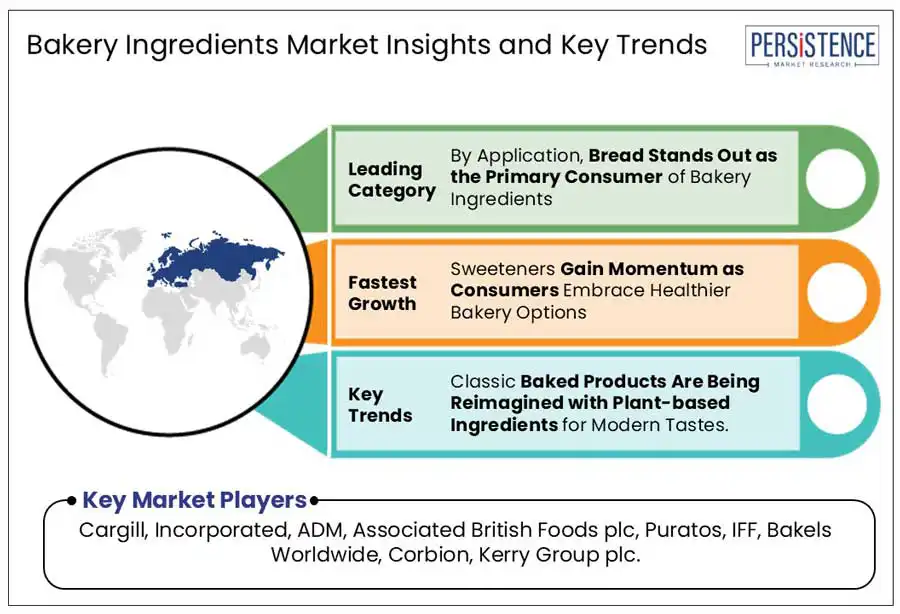Comprehensive Analysis of Bakery Ingredients Market Including Regional and Country Analysis in Brief.
Industry: Food and Beverages
Published Date: April-2025
Format: PPT*, PDF, EXCEL
Delivery Timelines: Contact Sales
Number of Pages: 140
Report ID: PMRREP3104
The global bakery ingredients market size is estimated to grow from US$21.9 billion in 2025 to US$36.1 billion to record a CAGR of 7.4% by 2032. According to the Persistence Market Research report, the bakery industry is expected to witness promising growth in the coming years, driven by rising demand for clean-label, functional, and plant-based products. It is shaped by innovations in artisanal baking, growing health consciousness, and strong support from government initiatives across emerging economies.

Key Industry Highlights
|
Global Market Attribute |
Key Insights |
|
Bakery Ingredients Market Size (2025E) |
US$ 21.9 Bn |
|
Market Value Forecast (2032F) |
US$ 36.1 Bn |
|
Projected Growth (CAGR 2025 to 2032) |
6.1% |
|
Historical Market Growth (CAGR 2019 to 2024) |
7.4% |
Consumers are increasingly drawn to artisanal, high-quality baked products that provide distinct flavor experiences and top-notch ingredient profiles. Unlike mass-produced products, artisanal bakeries embrace authenticity, creativity, and freshness, and frequently use premium ingredients like stone-ground flours, organic butter, ancient grains, and natural flavors. This shift in customer preferences is encouraging both established bakeries and newcomers to invest in high-quality, traceable ingredients to fulfill changing expectations.
One out of three Gen Z and millennial consumers now actively seek unique tastes and flavors in bakery products. These younger individuals seek transparency, origin, and culinary narratives related to their food choices in addition to experience. Thus, the bakery ingredients market is poised for a steady growth in the coming years.
According to the Food Allergy Research & Education (FARE), approximately 33 million Americans live with life-threatening food allergies, and 1 in 13 children are affected by these conditions. This growing prevalence is driving consumers to avoid common allergens such as gluten, soy, and nuts ingredients that is staple in bakery formulations. Parents and caregivers have become increasingly aware of the products they purchase, particularly when it comes to baked goods, which frequently include hidden allergens. Companies are forced by this paradigm shift to develop or reformulate allergen-free substitutes, usually at increased manufacturing costs and with limitations in shelf life, flavor, and texture.
The increased consumer interest in digestive wellness provides a great possibility for bakery ingredient manufacturers to offer baking mixes enriched with dietary fiber and gut-friendly enzymes. The increased consumer interest in digestive wellness provides a big potential for bakery ingredient makers to innovate and provide baking mixes enriched with dietary fiber and gut-friendly enzymes. As people are becoming more aware of the importance of gut health for immunity, mental health, and overall vitality, they are looking for functional bakery products that go beyond flavor and texture.
According to the Taste Tomorrow survey by Puratos Group, 75% of consumers globally are interested in foods that improve their gut health which is a clear indicator of the demand for gut-supportive bakery solutions.
Manufacturers prioritize health-conscious consumers’ choice by including prebiotic fibers, probiotics, and digestive enzymes into baking mixes. As the importance of digestive health in daily meals increases, advancements in gut-friendly bakery products align well with the shift toward clean-label, natural ingredients.
Flour dominates as the core ingredient in bakery products due to its essential structural and functional role. It is the primary component for a variety of baked goods, including bread, cakes, pastries, and cookies, giving texture, volume, and consistency. With increased demand for healthier and specialized flours such as whole wheat, multigrain, and gluten-free varieties, the segment is evolving in response to consumer demands for clean-label and nutritional options.
Along with flour, enzymes and emulsifiers play important roles in improving product quality and shelf-life. Enzymes are utilized to improve dough handling, increase volume, and maintain softness over time. They are particularly essential in clean-label formulations as natural alternatives to chemical additives.
Emulsifiers, on the other hand, help to maintain constant texture and moisture retention, which prevents staling and improves overall mouthfeel. Together, these ingredients complement flour to produce superior bakery products that satisfy modern consumer demands.
Bread is the leading consumer of bakery ingredients because of its global popularity, staple status, and high consumption frequency across different cultures. Bread is expected to account for 42% of the total market share in 2025. The bread industry, includes white, whole wheat, multigrain, sourdough, and artisan loaves is a major demand driver for bakery ingredients such as flour, yeast, emulsifiers, and preservatives.
Cakes and pastries are emerging as dynamic segments with promising CAGR driven by increasing consumer demand for indulgence and premium offerings. To create unique textures and flavors, these items usually use a wider range of bakery ingredients, including colors, flavors, specialized fats, and leavening agents. Innovations in plant-based and health-conscious cake recipes sum up as demand factors.

Europe dominates with a projected share of 32.6% in 2025 due to its deep-rooted baking traditions, strong demand for artisanal and functional goods, and a well-established supply network. According to the European Regional Development Fund (ERDF), Europe's per capita consumption of bread and bakery goods is 57 kg, with the majority of EU nations averaging about 50 kg per person per year. This high level of consumption directly drives demand for a diverse variety of baking ingredients, including flours, enzymes, emulsifiers, and leavening agents.
Despite Europe's considerable domestic production capacity, the region imports 800,000 to 1,000,000 tons of wheat for breadmaking each year, mainly sourced from North America. Furthermore, Germany, Italy, France, Belgium, and the Netherlands are among the leading worldwide exporters of bread, pastries, cakes, biscuits, and other bakery items. With a growing interest in clean-label and plant-based bakery solutions, Europe continues to set trends and drive innovation in the global baking ingredients market.
The North America bakery ingredients market is undergoing a dynamic the transition, driven by shifting consumer preferences and growing industry innovation. Key trends include creating gluten-free recipes for breads, pastries, and cakes that cater to increasing dietary sensitivities, as well as lowering sugar content or utilizing natural sweeteners to fulfill demand for healthier baked goods. Additionally, flavored breads infused with herbs, fruits, or nuts are gaining popularity due to their artisanal appeal. A strong push toward sourcing ingredients from local farms and producers is reflecting the region's focus on transparency and sustainability.
According to the American Bakers Association, the bakery industry in the U.S. has an economic impact of more than US$186 billion, demonstrating its importance in the national economy. Furthermore, Canada exports more than one million tons of bread products worldwide. This data reflects the region's strong production capacity and export potential, positioning North America as a vital hub for the global bakery ingredients market as well as an ideal place for innovation and market expansion.
Asia Pacific is witnessing a rapid growth fueled by changing consumer lifestyles and economic development in key economies such as China and India. China holds a significant share in the regional market due to expanding consumer affluence, urbanization, and the growing impact of Western food cultures. In major Chinese cities, Western-style baked goods are no longer just occasional treats but are steadily becoming part of daily diets, particularly among the expanding middle-class population. This shift is facilitated by the growing availability of baked goods in modern retail formats such as supermarkets and hypermarkets.
The bakery industry in India is predicted to grow at a rapid pace, considering rapidly growing population, shifting demographics, and rising disposable incomes. The rise of e-commerce and quick commerce platforms is enhancing product accessibility in both urban and rural locations. Additionally, government initiatives such as the Pradhan Mantri Kisan SAMPADA Yojana (PMKSY) and the Pradhan Mantri Formalisation of Micro food processing Enterprises (PMFME) schemes are actively supporting infrastructure and capacity-building efforts within the bakery value chain.
The global bakery ingredients market has become quite competitive, with a mix of major multinational companies and maturing local players. Key players are emphasizing innovations to meet changing consumer preferences, particularly for healthier and more natural baked products. The increasing demand for clean label components has encouraged manufacturers to replace synthetic additives with natural alternatives such as enzymes, plant-based emulsifiers, and organic flour.
Investment in R&D is at the forefront, with key players are constantly releasing new formulations that improve texture, shelf life, and nutritional value. The rise of artisanal and specialty bakeries has fueled innovation, as the niche players demand quality, functional, and versatile ingredients to create exceptional products. In addition, sustainability and transparency along the value chain are becoming increasingly important in ingredient sourcing.
|
Report Attribute |
Details |
|
Historical Data/Actuals |
2019 - 2024 |
|
Forecast Period |
2025 - 2032 |
|
Market Analysis |
Value: US$ Bn, Volume: Tons |
|
Geographical Coverage |
|
|
Segmental Coverage |
|
|
Competitive Analysis |
|
|
Report Highlights |
|
|
Customization and Pricing |
Available upon request |
By Product Type
By Form
By Application
By Distribution Channel
By Region
To know more about delivery timeline for this report Contact Sales

The global bakery ingredients market is projected to value at US$ 21.9 Bn in 2025.
Growth of Artisanal and Specialty Bakeries is Fueling Demand for Bakery Ingredients.
The Bakery Ingredients industry is poised to witness a CAGR of 7.4% between 2025 and 2032.
Creating baking mixes fortified with dietary fiber and gut-friendly enzymes to support overall gut health are the key market opportunities.
Major players include Cargill, Incorporated, ADM, Associated British Foods plc, Puratos, IFF, Bakels Worldwide, Corbion, Kerry Group plc., and others.